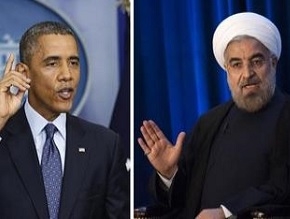|
World Jewish News

US President Barack Obama and Iranian President Hassan Rouhani. Photo: REUTERS
|
In flap with UN, a chance for the US to look tough on Iran
21.01.2014, Israel and the World During an awkward 24 hours for United Nations secretary-general Ban Ki-moon, his spokesman, Martin Nesirky, told reporters that Ban's decision to invite Iran to participate in the Geneva II summit on Syria "certainly... could not have been a surprise to US authorities."
"They were fully aware of the timing of the announcement," Nesirky said, after Ban's notice on Sunday night was swiftly followed by a sharp response from the United States.
Reaction from the State Department, and the Syrian opposition, was to demand the Iran invitation be rescinded— or else risk the very start of the conference scheduled for January 22.
The US had drawn a line on Iranian participation, and was sticking to it: unless the Islamic Republic endorsed the core tenets of the Geneva communiqué— a document from 2012 that calls for a transitional government in Syria, and recognizes the opposition of Syrian president Bashar Assad— then Iran could not participate in peace talks aimed at enforcing those tenets.
Hours after extending the invitation, Nesirky found himself explaining the UN chief's decision to rescind it. The US had successfully pressured the UN secretary-general into a public backtrack.
On a phone call with reporters on Tuesday, State Department deputy spokeswoman Marie Harf told The Jerusalem Post that the US had made clear its position both privately and publicly, and was not interested in dissecting a "tick tock" of the flap over Iran's role in the conference over the past 48 hours.
"What goes into when the UN announces things," Harf said, "are questions better referred to the UN."
But if the US had known the announcement was coming, and if the secretary-general still felt comfortable going forward with it, then he and his staff at the UN should not have been surprised at the American response. And yet they were.
That raises several important questions, including whether the US truly wanted the Geneva II conference to move forward.
When speaking candidly, no official seriously involved in these pre-Geneva negotiations— whether they be from Russia, the US, the UN or certainly from Syria— have any expectation of progress from the conference. The Syrian Coalition will attend reluctantly, but their leaders enter talks weaker than ever; and Assad has repeatedly shrugged off the Geneva communiqué, which would require him to recognize the very rebels that are fighting for his ouster.
Entering Geneva with sub-zero expectations, a public flap with the UN over Iran might have been interpreted as a win-win opportunity for the US.
The Obama administration had a chance, however hollow, to look tough in public on Iran. US officials demonstrated their ability to stick to a policy line previously laid before the international community on a significant issue. And they appeared ready to bear significant cost for enforcing it: the sacrifice of a major peace conference, months in the making.
Over the past several months, during negotiations over its nuclear program, the White House has learned the value of public diplomacy on Iran.
"I think the politics of trying to look tough on Iran are often good when you’re running for office or if you’re in office," US President Barack Obama said at a press conference in December.
The alternative would have been unfortunate: the altogether cancellation of a conference that is not likely to produce anything, anyway. But for once, the blame would have fallen at the feet of the secretary-general. Given the alternatives, the US could do worse.
By MICHAEL WILNER
JPost.com
|
|
